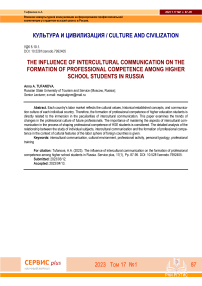The influence of intercultural communication on the formation of professional competence among higher school students in Russia
Автор: Tufanova A.A.
Журнал: Сервис plus @servis-plus
Рубрика: Культура и цивилизация
Статья в выпуске: 1 т.17, 2023 года.
Бесплатный доступ
Each country's labor market reflects the cultural values, historical established concepts, and communication culture of each individual country. Therefore, the formation of professional competence of higher education students is directly related to the immersion in the peculiarities of intercultural communication. This paper examines the trends of changes in the professional culture of future professionals. The importance of mastering the aspects of intercultural communication in the process of shaping professional competence of HSE students is considered. The detailed analysis of the relationship between the study of individual subjects, intercultural communication and the formation of professional competence in the context of cultural features of the labor sphere of foreign countries is given.
Intercultural communication, cultural environment, professional activity, personal typology, professional training
Короткий адрес: https://sciup.org/140299770
IDR: 140299770 | DOI: 10.5281/zenodo.7992405
Список литературы The influence of intercultural communication on the formation of professional competence among higher school students in Russia
- Baydenko, V.I. (2004). Kompetencii v professionalnom obrazovanii (k osvoeniyu kompetentnostnogo podkhoda) [Competencies in professional education (the development of a competence-based approach)]. Vysshee obrazovanie v Rossii [Higher education in Russia], 11, 3-13. (In Russ.).
- Ignatenko, N.A. (2000). Faktory formirovaniya inoyazychnoy sociokulturnoy kompetencii budushchego uchitelya [Factors of formation of foreign-language socio-cultural competence of a future teacher]: Candidate of Pedagog-ics’ thesis. Voronezh: Pedagogy. (In Russ.).
- Kovalev, V.I. (1988). Motivy povedeniya i deyatelnosti [Behavior and activity motivation]. Moscow: Nauka. (In Russ.).
- Markova, A. K. (1996). Psikhologiya professionalizma [Psychology of professionalism]. Moscow: Pedagogy. (In Russ.).
- Raven J. (2002). Kompetentnost v sovremennom obshchestve: vyyavlenie, razvitie i realizaciya [Competence in modern society: Its Identification, Development and Release]. Moscow: Kogito-center. (In Russ.).
- Rean, A.A. (2001). Psikhologiya i pedagogika [Psychology and Pedagogy]. St. Petersburg: Publishing house "Peter". (In Russ.).
- Rybak M.V., Krylova T.V. (2022). The use of authentic audio and video materials in teaching students of a non-linguietic university. Service plus, 16(3), Pp. 52-59. DOI: 10.5281/zenodo.7378512 (In Russ.).
- Rybak, M.V. (2022). Implementation of a practice-oriented approach in the teaching staff training. Praktiko-orientirovannaya podgotovka pedagoga-issledovatelya v vuze [Practice-oriented training of a teacher-researcher at a uni-versity]: Proceedings of the All-Russian Scientific and Practical Conference Saransk: Mordovian State Pedagogical Uni-versity named after M.E. Evseviev, 36. (In Russ.).
- Stepanov, E.N., Gavrilov, V.A. et al. (1990). Psikhologo-pedagogicheskie aspekty adaptacii studentov k uchebnomu processu v vuze [Psychological and pedagogical aspects of students' adaptation to the educational process at the university]. Chisinau: "Stiinza". (In Russ.).
- Yakimanskaya, I.S. (2003). Lichnostno-orientirovanniy podkhod v rabote pedagoga: razrabotka i ispolzovanie [Personality-oriented approach in the work of a teacher: development and use]. Moscow: Sphera. (In Russ.).
- Zimnaya, I.A. (2004). Klyuchevye kompetencii kak rezultativno-klyuchevaya osnova kompetentnostnogo pod-khoda v obrazovanii [Key competencies as the effective-target basis of the competence approach in education]. Moscow: Research Center for quality problems of training specialists. (In Russ.).


